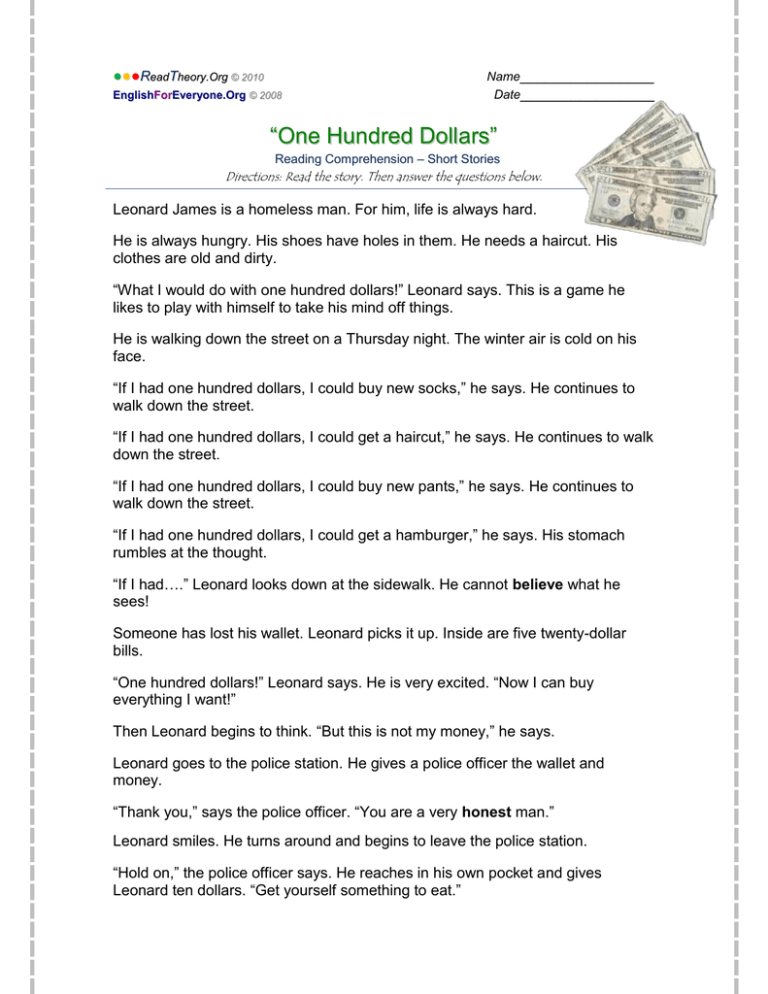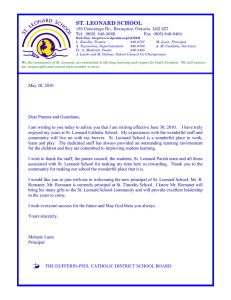One Hundred Dollars - English for Everyone
advertisement

●●●ReadTheory.Org © 2010 EnglishForEveryone.Org © 2008 Name________________ Date________________ “One Hundred Dollars” Reading Comprehension – Short Stories Directions: Read the story. Then answer the questions below. Leonard James is a homeless man. For him, life is always hard. He is always hungry. His shoes have holes in them. He needs a haircut. His clothes are old and dirty. “What I would do with one hundred dollars!” Leonard says. This is a game he likes to play with himself to take his mind off things. He is walking down the street on a Thursday night. The winter air is cold on his face. “If I had one hundred dollars, I could buy new socks,” he says. He continues to walk down the street. “If I had one hundred dollars, I could get a haircut,” he says. He continues to walk down the street. “If I had one hundred dollars, I could buy new pants,” he says. He continues to walk down the street. “If I had one hundred dollars, I could get a hamburger,” he says. His stomach rumbles at the thought. “If I had….” Leonard looks down at the sidewalk. He cannot believe what he sees! Someone has lost his wallet. Leonard picks it up. Inside are five twenty-dollar bills. “One hundred dollars!” Leonard says. He is very excited. “Now I can buy everything I want!” Then Leonard begins to think. “But this is not my money,” he says. Leonard goes to the police station. He gives a police officer the wallet and money. “Thank you,” says the police officer. “You are a very honest man.” Leonard smiles. He turns around and begins to leave the police station. “Hold on,” the police officer says. He reaches in his own pocket and gives Leonard ten dollars. “Get yourself something to eat.” Questions: 1) What is life like for Leonard? A. B. C. D. It is hard. It is easy. It is warm. It is full of good food. 2) How does the reader know that Leonard is poor? I. He finds a wallet. II. He has no home. III. He is always hungry. A. B. C. D. I only I and II II and III I, II, and III 3) Why does Leonard think about what 4) What time of year is it? he would do with a hundred dollars? A. spring B. summer A. It helps him go to sleep. C. fall B. It takes his mind off things. D. winter C. The police officer asks him to. D. He knows he will find the money. 5) What does Leonard say he would do with a hundred dollars? I. get a haircut II. buy new clothes III. get a hotel room A. B. C. D. I only I and II II and III I, II, and III 7) “He cannot believe what he sees.” What is another way to write this sentence? A. He thinks what he sees is crazy. B. He feels what he sees is good luck. C. He thinks what he sees cannot be true. D. He thinks what he sees is scary. 6) Why does Leonard's stomach rumble? A. B. C. D. because he is hungry because he is tired because his clothes are dirty because he is homeless ________ 8) Why does Leonard go to the police station? A. B. C. D. because he owes money because he wants a reward because the wallet is not his because he has committed a crime Questions (continued): 9) What kind of man does Leonard seem to be? A. B. C. D. bad dumb good old 11) How does Leonard seem to feel about what he has done? A. B. C. D. angry happy sad unsure 13) What kind of man does the police officer seem to be? A. B. C. D. angry busy kind mean 10) As used at the end of the story, what does it mean to be honest? A. B. C. D. to feel good to want more to be truthful to be hopeful 12) What does the police officer give Leonard? A. B. C. D. advice a handshake money to eat the one hundred dollars 14) Why does the police officer give Leonard ten dollars? A. to surprise Leonard B. so Leonard feels better about returning the wallet C. because it is part of his job D. because he wants to get Leonard off the streets If you found one hundred dollars, would you keep it? Why or why not? ________________________________________________________________________ ________________________________________________________________________ ________________________________________________________________________ ________________________________________________________________________ ________________________________________________________________________ ________________________________________________________________________ ________________________________________________________________________ Answers and Explanations 1) A At the beginning, the story says, “Leonard James is a homeless man. For him, life is always hard.” We can understand from this that life is hard for Leonard. This makes (A) correct. Since life for Leonard is hard, it is not easy. Therefore (B) is incorrect. Near the beginning, the story says that “the winter air is cold on” Leonard’s face. We can understand from this that Leonard is not warm, so (C) is incorrect. Near the beginning, the story says that Leonard “is always hungry,” so (D) is incorrect. 2) C Since anyone can find a wallet, the fact that Leonard finds a wallet does not tell us that Leonard is poor. This eliminates option (I). The beginning of the story tells us that Leonard is homeless. This means that Leonard does not have enough money to buy or rent a home. This supports option (II). Near the beginning, the story tells us that Leonard “is always hungry.” Later, Leonard imagines that he could get a hamburger if he had one hundred dollars. We can understand from this that Leonard is hungry because he does not have enough money to buy food. This supports option (III). Therefore (C) is correct. 3) B Near the beginning of the story, Leonard says, “What I would do with one hundred dollars!” The story then says, “This is a game he likes to play with himself to take his mind off things.” Thinking about what he would do with one hundred dollars is something that Leonard does to “take his mind off things,” so (B) is correct. The story does not provide information to support answer choices (A), (C), and (D). Therefore they are incorrect. 4) D Near the beginning, the story says, “The winter air is cold on his face.” We can understand from this information that the story takes place in the winter. This makes (D) correct. The story does not provide information to support answer choices (A), (B), and (C). Therefore they are incorrect. 5) B In the middle of the story, Leonard lists all the things that he would buy with one hundred dollars. “If I had one hundred dollars, I could get a haircut,” Leonard says. This supports option (I). Leonard also says that with one hundred dollars, he “could buy new socks,” and “could buy new pants.” Socks and pants are clothes, so these statements support option (II). Leonard does not say that he would get a hotel room with the one hundred dollars, so this eliminates option (III). Therefore (B) is correct. 6) A In the middle of the story, Leonard says, “If I had one hundred dollars, I could get a hamburger.” Then, Leonard’s “stomach rumbles at the thought.” After Leonard starts thinking about food, his stomach rumbles. We can understand from this information that Leonard’s stomach rumbles because he is hungry. This means (A) is correct. The story says that Leonard’s life is hard, but the story does not say anything about Leonard being tired. Therefore (B) is incorrect. Leonard’s clothes are dirty, but that could not make Leonard’s stomach rumble. This rules out (C). Leonard is homeless, and he is probably hungry because he is homeless. However, Leonard’s stomach rumbles because Leonard is hungry, not because Leonard is homeless, so (D) is incorrect. 7) C believe (verb): to accept as true or real. In this story, we learn that “One Hundred Dollars” is a game that Leonard plays in order to forget about his difficult life. Although Leonard thinks about what he would do with one hundred dollars, Leonard does not actually expect to have one hundred dollars. When Leonard sees a wallet on the ground with one hundred dollars in it, it is very surprising to him, because he was just thinking about what he would do with that much money. Finding the money while thinking about the money is such a surprising coincidence that Leonard finds it hard to accept that the money is really there. Leonard thinks that it cannot be true that there is one hundred dollars on the ground. This makes (C) correct. Crazy means insane. Leonard is surprised to see the money, but there is no reason for Leonard to think that it is insane to see the money. This makes (A) incorrect. Luck is fate or fortune. It is good luck that Leonard finds the money, but that is not connected to whether he believes it is true or not. A person could also not believe something that is bad luck. This makes (B) incorrect. Something that is scary is frightening. Leonard is surprised by the money, but he does not seem to be frightened by finding the money, so (D) is incorrect. 8) C Near the end of the story, Leonard is excited because he found the wallet. “Then Leonard begins to think.” He thinks, “This is not my money.” Next, Leonard goes to the police station and turns in the wallet. Since Leonard turns in the wallet right after thinking about how the wallet belongs to someone else, he must turn in the wallet because the wallet does not belong to him. This makes (C) correct. There is nothing in the story that tells us that Leonard owes money, so (A) is incorrect. Leonard does receive ten dollars from the police officer after Leonard turns in the wallet, but since Leonard did not know that the officer would give him that money, that cannot be the reason Leonard turned in the wallet. This means (B) is incorrect. Leonard has not committed a crime, so (D) is incorrect. 9) C Leonard turns in the wallet even though he is poor and could really use the money. Leonard does this because the wallet does not belong to him. Since Leonard has done what is right even though it was difficult, he is a good man. This means (C) is correct. Leonard has not done anything harmful in the story, so he is not a bad man. Therefore (A) is incorrect. Life is hard for Leonard, and he needs many things, but Leonard has done nothing in the story that could make us think that he is dumb. This makes (B) incorrect. Leonard’s clothes are old, but the story does not tell us that he is old, so (D) is incorrect. 10) C honest (adjective): displaying integrity; just or fair. Leonard takes the wallet to the police station even though he could really use the money. Leonard turned the wallet in because the wallet did not belong to him. The police officer says that Leonard is “a very honest man.” Since the police officer called Leonard honest after he turned in the wallet that did not belong to him, honest must mean to be truthful and do the right thing. Therefore (C) is correct. We know that Leonard wears old, dirty clothes and worn out shoes, and he needs a haircut. When Leonard turns in a wallet with money in it, the police officer can see that Leonard could use that money, so the police officer would not say that Leonard must feel good to turn in the money. Therefore (A) is incorrect. Leonard has nothing to begin with and asks for nothing when he turns in the wallet, so the police officer would not say that Leonard wants more because he turns in the wallet. This makes (B) incorrect. Again, Leonard does not ask for anything when he turns in the wallet. Leonard does not even think about getting something in return for turning in the wallet. Therefore, Leonard is not hopeful when he turned in the wallet. This means (D) is incorrect. 11) B After turning in the wallet, “Leonard smiles.” Since turning in the wallet makes Leonard smile, we can understand that he feels happy about turning in the wallet. Therefore (B) is correct. The story does not provide information to support answer choices (A), (C), and (D). Therefore they are incorrect. 12) C At the end of the story, the police officer stops Leonard. The officer “reaches in his own pocket and gives Leonard ten dollars.” Then the officer says, “Get yourself something to eat.” We can understand from this that the officer has given Leonard money for food to eat. This makes (C) correct. The story does not provide information to support answer choices (A), (B), and (D). Therefore they are incorrect. 13) C The officer stops Leonard while Leonard is leaving. The officer “reaches in his own pocket and gives Leonard ten dollars.” We can understand from this information that the officer has given Leonard some of the officer’s own money since Leonard is poor. This is kind. This means (C) is correct. The story does not provide information to support answer choices (A), (B), and (D). Therefore they are incorrect. 14) B Leonard walks into the police station with his worn out shoes, old, dirty clothes and uncut hair. We know that Leonard looks poor, and the police officer can see this, too. Since Leonard really needs the money, Leonard will probably feel badly once he has turned the money in. We can understand from this information that the officer has given Leonard the money in order to make him feel better about turning in the wallet. This means (B) is correct. Leonard may have felt surprised when the officer gave him the ten dollars, but there is no reason that the officer would want to surprise Leonard. This makes (A) incorrect. The officer gave Leonard ten dollars of his own money, so giving Leonard the money was not part of the officer’s job. This means (C) is incorrect. Ten dollars would not be enough money to get Leonard off the streets. Therefore (D) is incorrect.


